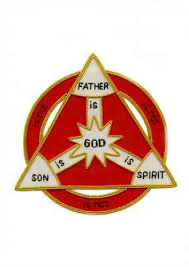Decisions, Decisions
This is the sermon I preached today at St. Timothy Lutheran Church. The gospel is Matthew 28:16-20.
The dilemma I face when I have to decide what to eat at a restaurant is similar to the one faced by the disciples when they had to decide between worshiping the Lord and doubting his authority. Another way to put this could be, is he or isn’t he?
The reaction of the disciples to seeing Jesus may seem a bit odd. After all, they have spent three years with Jesus—listening to his teaching, watching him work miracles and
witnessing his death. After the resurrection, they still struggled with their faith.
The doubt the disciples experienced was not some theoretical skepticism. Rather, it was the risky wavering of the one who must decide when more than one possibility seems reasonable and right (M. Eugene Boring). The disciples who worshiped were also those who doubted. It’s as Luther referred to God’s children as being simultaneously saints and sinners. We can be both worshipers and doubters at the same time.
The second part of today's gospel reading, known as the Great Commission, was given to followers with a variety of emotions. We don’t have to be perfect to serve God. We just have to be willing. God uses worshiping-doubting disciples and even mixed bags like us.
Jesus comes to meet us wherever we are and however we are, just as Jesus came to the disciples after they met at the mountain.
Now that we understand that God can use anybodies, nobodies, and somebodies, what exactly does God want us to do? Jesus has all authority, which means he has the right to control or command; he has absolute power and warrant. This authority and power is the basis and foundation of Jesus’ charge to his followers. These are the credentials for the disciples’ mission and the promise of power to carry it out. The mission is not jeopardized by the disciples’ weaknesses or limited by their uncertainties.
Jesus instructs his disciples to make more disciples. Disciples are pupils or learners. In Greek, the word translated as disciple is an imperative verb. Going, teaching and baptizing modify the verb disciple and are elements of discipling.
What exactly does disciple-making involve? We cannot just sit comfortably in our pews each Sunday, wringing our hands, wondering why attendance is down. Those gathered here today are already followers of Jesus, so we must GO OUTSIDE our comfort zone and our church to share the good news and disciplize. Our goal is not to grow the church to simply fill the pews and offering plates. The goal is that as many people as possible hear how much God loves them.
Once we have gone outside the church, what is involved in people becoming disciples and followers of Jesus? Jesus said we are to baptize and teach. This explains the process of making disciples. Baptism and teaching go together. Baptism is more than mere fire insurance, but rather it is the initiation into the church, the body of Christ. Baptism introduces people to life in God’s reign.
Baptism initiates us into the teaching ministry of the church, not just into church membership. But that is not the end of the process of becoming a disciple. Being introduced to Jesus is one thing. Getting to know him is something else entirely. That is the role of teaching. Teaching about the faith is more than just imparting knowledge. It is more than just the pastor’s work. It is the work of all the people of God.
The second part of teaching is a lifelong process of developing a relationship with Jesus as your Lord and Savior. As well as learning what Jesus said and did, we need to desire what he said and emulate what he did. This teaching involves living life in such a way that others will want to know what we have that makes a difference in our lives. An unbelieving college professor can teach about Christianity, but only a believer can share the spirit and essence of what it means to follow Jesus. Only disciples are able to produce other disciples.
How can we do that? We are not Jesus. He commissioned his disciples because he had all authority. Jesus sends us too and we have his authority. In addition to Jesus’ authority and power, we have the promise of his presence.
So, what is there to be afraid of? We will experience obstacles to sharing our faith, both cultural and personal. This can be scary stuff. What if, when we share our story of faith, people laugh at us for believing? That could happen.
The early Christians struggled with much more than shyness about sharing their faith. They met with out-and-out persecution and martyrdom. That is why Jesus promised his first followers that he would be with them until the end of the age. God’s people have labored in the assurance of his presence in and with the church. We too, are part of that same church. The God who was with the martyrs in their death and ushered them into the Father’s presence is the same God who accompanies his church today.
As we celebrate Holy Trinity Sunday, we are called to bear witness to “the love and mercy of the God we know and name as Father, Son and Holy Spirit” (David Lose). God the Holy Spirit makes it possible for us to recognize and believe the good news of God the Son, who, in turn, reveals to us the loving heart and mission of God the Father. Let us begin together to dream boldly about what new ventures God is calling us to as a community of faith.
Amen!



Comments